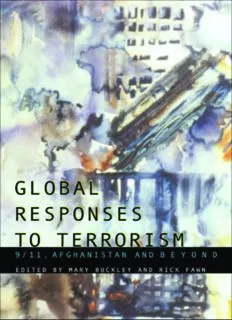Table Of ContentGlobal Responses to Terrorism
The terrible attacks on September 11 and more recent atrocities in Russia,
Indonesia, Kenya and Saudi Arabia have demonstrated that terrorism is a global
threat to stability, democracy and prosperity. This text examines how the world
has reacted to, and been affected by, September 11, the ensuing war in Afghani-
stan and President George W. Bush’s declaration of a ‘war on terror’ as the ‘first
war of the twenty-first century.’
The contributors trace the reactions of individual governments and public
opinion across North America, Europe, the Middle East, Africa and Asia to
terrorism, the war in Afghanistan and Iraq. The discussion of individual countries
is placed in context through an examination of wider issues such as the future of
al-Qaeda, the growing refugee problem, the effect on the world economy and a
significant revisiting of our approaches to understanding international relations.
There are now many books available on terrorism but few can boast the quality
and range of the contributions to this volume, which locate the war on terror in
a truly global intellectual context. It is essential reading for all students of
international relations and terrorism as well as the general reader wishing to
understand this complex subject.
Contributors: Paul Wilkinson, Rohan Gunaratna, Robert Singh, Andrew
Dorman, Richard McAllister, Adrian Hyde-Price, Philip A. Daniels, Roland
Dannreuther, Raymond Hinnebusch, Gwenn Okruhlik, David Newman, David
Kenda Adaka Kikaya, James Putzel, Samina Yasmeen, Raju G. C. Thomas, Rex
Li, Sally N. Cummings, Joanne Wright, Joanne van Selm, Brigitte Granville,
Christopher Coker and Barry Buzan.
Mary Buckley is currently an independent scholar living in London having
previously enjoyed research affiliations at Michigan, Kiev, Moscow, and Azerbai-
jan universities, and teaching posts at Edinburgh and London universities. Her
books include Women and Ideology in the Soviet Union (1989), Redefining Russian Society
and Polity (1993), Post-Soviet Women: From the Baltic to Central Asia (edited, 1997) and
Kosovo: Perceptions of War and its Aftermath (co-edited, 2002).
Rick Fawn is a Senior Lecturer in International Relations at the University of
St. Andrews. Among his books are International Society after the Cold War: Anarchy and
Order Reconsidered (co-edited, 1996). The Czech Republic: A Nation of Velvet (2000) and
Ideology and National Identity in Post-Communist Foreign Policies (edited, 2003).
Global Responses to
Terrorism
9/11, Afghanistan and beyond
Edited by Mary Buckley and
Rick Fawn
First published 2003
by Routledge
11 New Fetter Lane, London EC4P 4EE
Simultaneously published in the USA and Canada
by Routledge
29 West 35th Street, New York, NY 10001
Routledge is an imprint of the Taylor & Francis Group
This edition published in the Taylor & Francis e-Library, 2004.
© 2003 Mary Buckley and Rick Fawn selection and editorial matter;
individual chapters, the contributors
All rights reserved. No part of this book may be reprinted or reproduced or
utilized in any form or by any electronic, mechanical, or other means, now
known or hereafter invented, including photocopying and recording, or in
any information storage or retrieval system, without permission in writing
from the publishers.
British Library Cataloguing in Publication Data
A catalogue record for this book is available from the British Library
Library of Congress Cataloging in Publication Data
Global responses to terrorism: 9/11, the war in Afghanistan and beyond/
edited by Mary Buckley and Rick Fawn.
p. cm.
Includes bibliographical references and index.
1. Terrorism – Prevention. 2. International relations. I. Buckley, Mary
(Mary E. A.) II. Fawn, Rick.
HV6431.G56 2003
303.6′25 – dc21 2003003799
ISBN 0-203-50381-3 Master e-book ISBN
ISBN 0-203-33699-2 (Adobe eReader Format)
ISBN 0–415–31429–1 (hbk)
ISBN 0–415–31430–5 (pbk)
This volume is dedicated to the
memory of Professor John Erickson
who would have joined us in this project if he could have
with provocative reflections on geopolitics
Contents
Notes on contributors x
Acknowledgments xvi
Maps xvii
Introduction: world reactions to September 11 and the
‘war on terror’ 1
MARY BUCKLEY
1 From ground zero to the war in Afghanistan 11
RICK FAWN
2 Implications of the attacks of 9/11 for the future
of terrorism 25
PAUL WILKINSON
3 Al-Qaeda: organization and operations 37
ROHAN GUNARATNA
4 Superpower response: the United States of America 52
ROBERT SINGH
5 Loyal ally: the United Kingdom 66
ANDREW DORMAN
6 Reluctant moral middle power: Canada 79
RICK FAWN
7 Support from a bicephalous executive: France 90
RICHARD McALLISTER
8 Redefining its security role: Germany 101
ADRIAN HYDE-PRICE
viii Contents
9 Leadership seeking greater legitimacy: Italy 113
PHILIP A. DANIELS
10 Radical Islamist state and secular Arab nationalism:
Iran and Iraq 122
ROLAND DANNREUTHER
11 Support with qualification: Syria 135
RAYMOND HINNEBUSCH
12 Conflicting pressures: Saudi Arabia 144
GWENN OKRUHLIK
13 The consequence or the cause? Impact on the
Israel–Palestine peace process 153
DAVID NEWMAN
14 A vulnerable continent: Africa 165
DAVID KENDA ADAKA KIKAYA
15 Political Islam in Southeast Asia and the
US–Philippine alliance 176
JAMES PUTZEL
16 Unexpectedly at center stage: Pakistan 188
SAMINA YASMEEN
17 In the middle ground: India 202
RAJU G. C. THOMAS
18 A rising power with global aspirations: China 210
REX LI
19 Former superpower: the Russian Federation 221
MARY BUCKLEY
20 Negotiating the US presence: the Central Asian states 239
SALLY N. CUMMINGS
21 International organizations: the UN, NATO and the EU 252
JOANNE WRIGHT
22 Perceptions of Afghan refugees 265
JOANNE VAN SELM
Contents ix
23 The global economy: what has changed? 276
BRIGITTE GRANVILLE
24 War without warriors 284
CHRISTOPHER COKER
25 Implications for the study of international relations 296
BARRY BUZAN
26 The war on terror: international implications 310
MARY BUCKLEY AND RICK FAWN
Selected bibliography 319
Index 323
Description:Global Responses to Terrorism is a useful book for understanding the history of the world immediately following the 9/11 terrorist attack and the first year of the War on Terror. It examines political, media and public responses to the attack, giving insight into the thinking of a wide variety of ac

